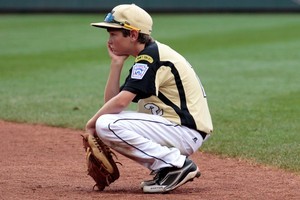The Ridiculous Choice This 8-Year-Old Has To Make

At the next stage of the sport, as I learned from another parent at the game, there are drafts, twice weekly practices, twice weekly games — and that’s just during the week. To be good you need to also play travel teams on the weekends. If you’re a kid playing for fun, choose to excel or forget about it. This same scenario is repeated in every sport he plays.
When I talk to other parents, to a person they rue this hyper-competitive culture we live in. So who’s starting it anyway? And why can’t we turn it around?
We’ve heard the steep price of this. I recently had a conversation with a first-grade teacher about the alarming number of parents at the school open house who alerted to her to their child’s anxiety issues.
First-grade kids with anxiety? What the what?
This has been going on for awhile with no signs of abating. Several books like Bringing up Bebe and the Battle Hymn of the Tiger Mother have debated the frenzy of overachieving, helicopter parents living out their own dreams by pushing their kids.
We talk. We lament. Nothing changes.
I’ve heard about the resistors and the slow parenting movement. But it’s a societal web we’re all caught in, where peer pressure holds it together. Try telling your kid that he’s failing at the sport he loves because, while his friends are getting private lessons, his family is “slow parenting.”
I worry about this for our society. In my day, you could actually start playing a sport in high school and do just fine. After all, most kids are in sports to build social skills, not make the pros. Childhood is about self-exploration and identity building. We learn about ourselves and our capabilities by experiencing a variety of things over time. Who knows what you’ll enjoy at 18 when you’re only 8? Guess today, you have to think way ahead.
We hear so much about how America’s behind in just about every subject possible, and the need for greater STEM education. All important priorities.

But concurrent to that, what about the need for well-rounded human beings? Those who have exposure to a variety of experiences? The well-read? The intellectually curious? The creative thinkers?
Sure, it might seem great to be the best at one thing. When I look at the best leaders, they are the opposite. They’re just plain good at many things. Their perspectives are broad, having had exposure to a variety of experiences. They have empathy because they’ve been around a wide swath of people. They retain a desire to expand their learning.
We’re teaching our kids to have a singular focus of excellence. As a leadership coach, and instructor in Georgetown’s leadership institute, I can tell you that’s the opposite of what we’re needing from our leaders. We don’t need experts, we need those with wide fields of vision and multiple connection points with others.
We need to be growing future leaders. We have big problems to solve in the decades ahead, and global communities and workforces to engage.
This mother, and citizen, is frustrated. How can we provide our kids with better educations in school, in sports, and in life? I’d love to know the answer. Anyone have it?
Kristi Hedges is a leadership coach, speaker and author of Power of Presence: Unlock Your Potential to Influence and Engage Others. Find her at kristihedges.com and @kristihedges.
(Image credit: Getty Images via @daylife from the 2011 Little League World Series)
Sign up to receive monthly posts + helpful tools + free chapters of The Power of Presence and The Inspiration Code.
Other Recent Posts
Why 2021 is Your Reset Year
March 8, 2021
Remember What You Loved About Your Job? It’s Still There If You Look.
November 30, 2020
Leading During COVID: What To Say When You Don’t Know What To Say
July 21, 2020
Leading When the Plan is No Real Plan at All
May 26, 2020
How to Lead with Positivity When The World Is In Chaos
February 21, 2020
When Work Is Soul Crushing
January 30, 2020
If You Want to Look Smart, Ask These Questions
November 26, 2019
Make Professional Development Less Work and More Fun
October 22, 2019

